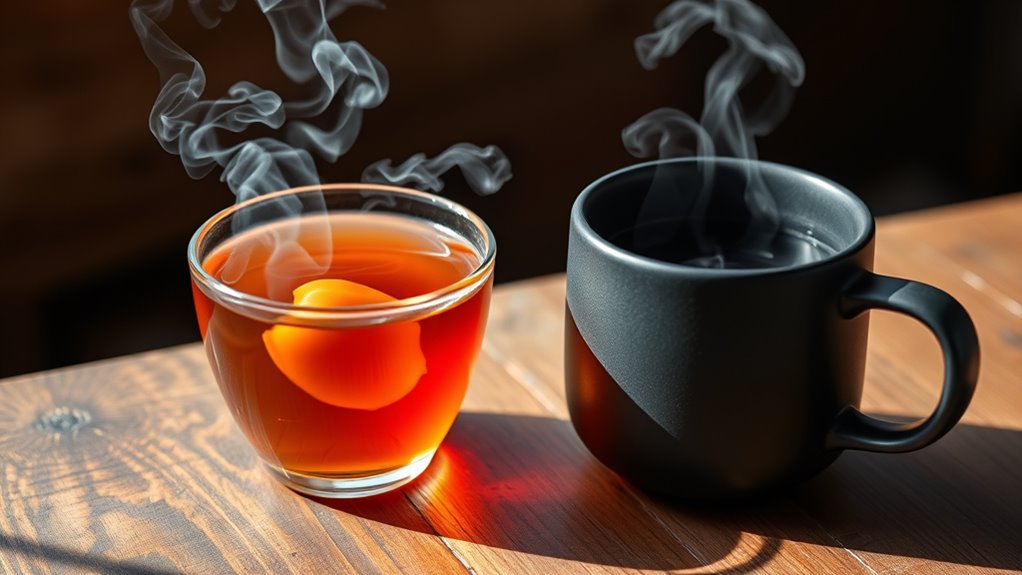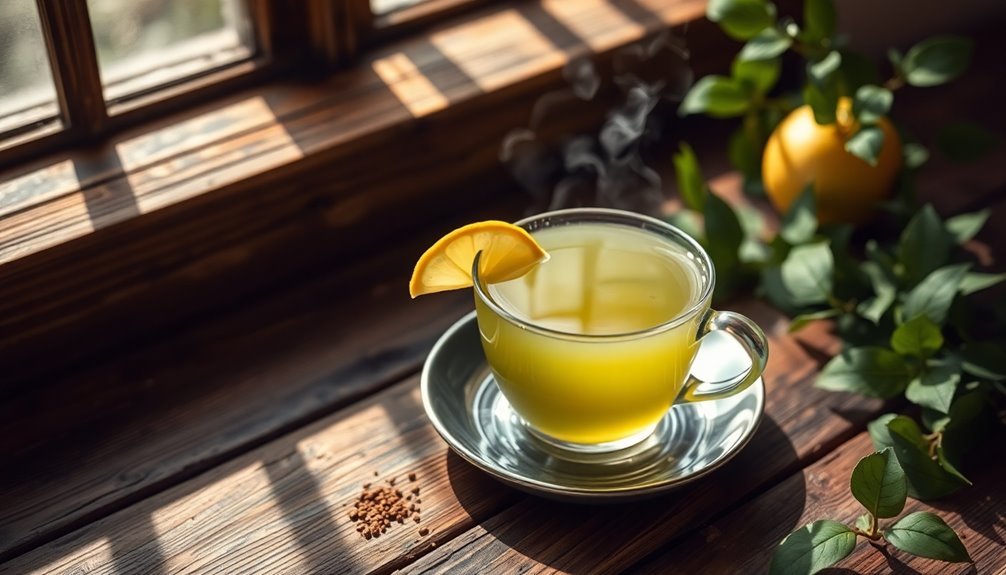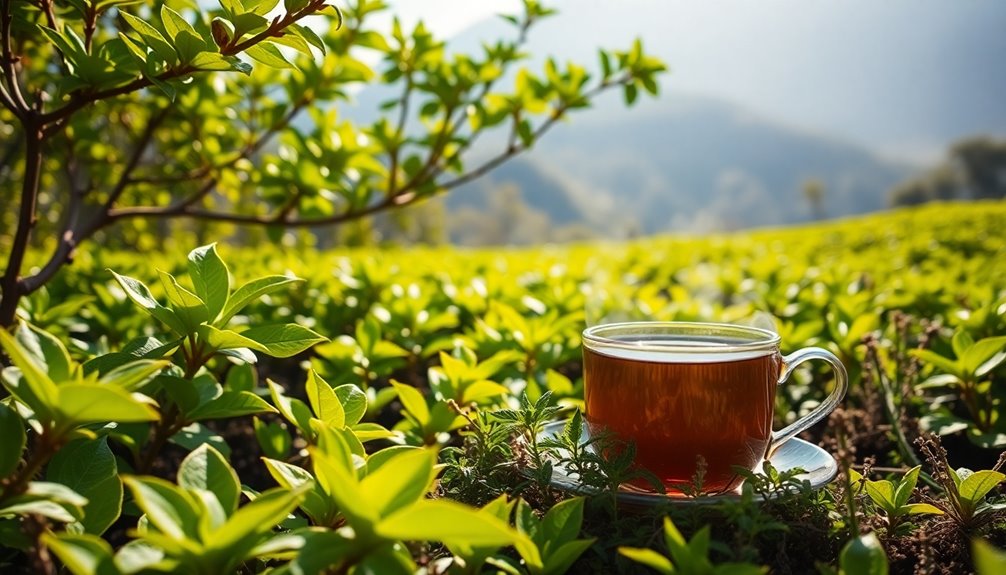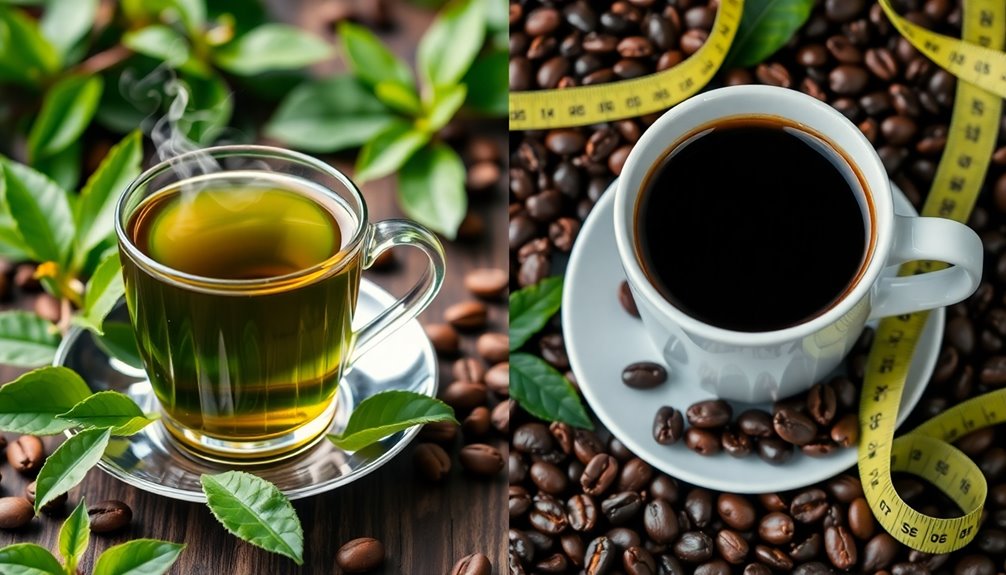If you want to rev up your metabolism faster, black tea might be your best bet because it has higher caffeine levels that provide a more noticeable energy boost. Oolong also helps with fat burning, thanks to its antioxidants, but contains less caffeine. The processing differences affect their potency—black tea’s full oxidation slightly reduces antioxidants, while oolong’s partial oxidation preserves more. Want to discover which tea truly suits your health goals? Keep exploring for more insights.
Key Takeaways
- Black tea has higher caffeine content (40-70 mg per 8 oz) than oolong (30-50 mg), providing a stronger metabolic boost.
- Both teas contain antioxidants that support metabolism, but black tea’s full oxidation may reduce antioxidant potency slightly.
- Caffeine stimulates nervous system activity and fat oxidation, making black tea more effective for rapid metabolism increase.
- Oolong’s partial oxidation preserves more antioxidants, which can enhance metabolic rate with milder stimulant effects.
- Choice depends on caffeine sensitivity; black tea offers a stronger energizing effect, potentially revving metabolism faster.
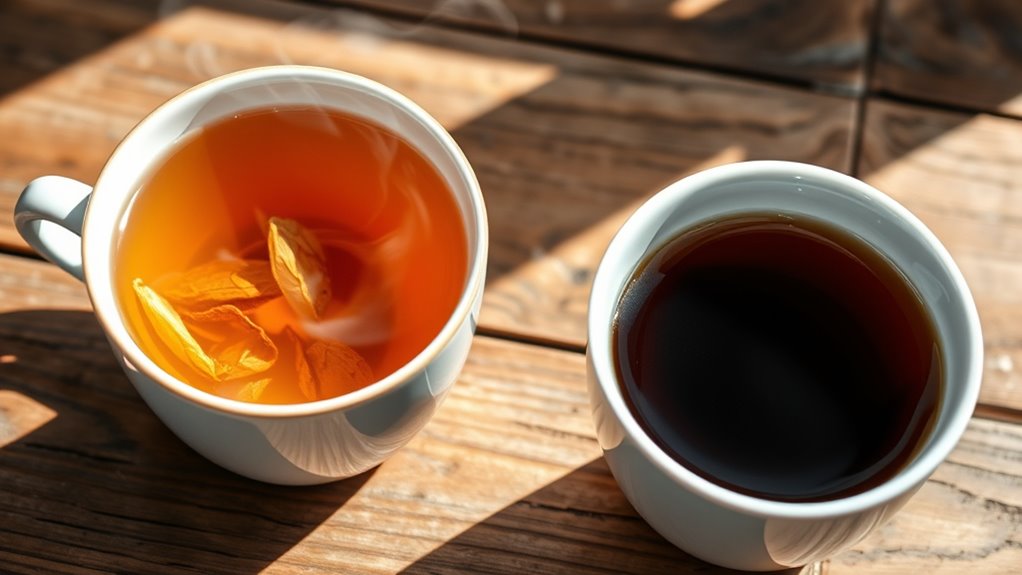
When comparing oolong and black tea, it’s important to understand their differences in flavor, processing, and health benefits. Both teas come from the Camellia sinensis plant, but their distinct processing methods give them unique characteristics. Oolong tea is partially oxidized, falling somewhere between green and black tea in terms of oxidation level. Black tea, on the other hand, undergoes full oxidation, resulting in a richer, more robust flavor. These processing differences influence not only taste but also their nutritional profiles, especially regarding tea antioxidants and caffeine content.
Tea antioxidants are essential because they combat free radicals, potentially reducing inflammation and supporting overall health. Oolong tea typically contains a high level of these antioxidants, thanks to its partial oxidation process. This makes it a potent choice for those looking to boost their intake of beneficial compounds. Black tea also boasts antioxidants, but the full oxidation process can diminish some of these beneficial compounds compared to less oxidized teas. However, black tea still offers significant health benefits, including improved heart health and lower cholesterol levels, thanks to its antioxidant properties.
Caffeine content plays a pivotal role in how these teas might help rev up your metabolism. Generally, black tea contains more caffeine than oolong, making it a better option if you’re seeking an energizing effect. For example, a typical 8-ounce cup of black tea can have around 40-70 milligrams of caffeine, while oolong usually provides about 30-50 milligrams. This difference means black tea might give you a more noticeable boost in alertness and energy, which can translate into a slight increase in metabolic rate. However, the caffeine in oolong is still enough to stimulate your nervous system without causing jitters, and some studies suggest that the combination of caffeine and tea antioxidants can enhance your body’s ability to burn fat.
Additionally, the degree of oxidation influences the stability and bioavailability of tea antioxidants, further affecting their health benefits. When choosing between oolong and black tea for metabolism support, consider your caffeine sensitivity and flavor preference. If you want a milder taste with a slightly lower caffeine punch, oolong is a good pick. If you prefer a stronger flavor and a more significant caffeine kick, black tea might be better suited. Both teas can help rev up your metabolism, but the key lies in their antioxidants and caffeine levels, which work together to boost energy expenditure and promote fat oxidation. Ultimately, enjoying either tea as part of your daily routine can contribute to your health and weight management goals, especially when combined with a balanced diet and regular exercise.
Frequently Asked Questions
Can Oolong or Black Tea Aid in Weight Loss?
You might find that both oolong and black tea can support weight loss by boosting your metabolism. Their tea flavor profiles and unique brewing techniques influence how effective they are. Oolong, with its complex flavors, may slightly enhance fat burning, while black tea’s robust taste offers antioxidants. Incorporate these teas into your routine, brewing them properly, to help support your weight management goals naturally.
How Much Caffeine Is in Oolong Compared to Black Tea?
Your question about caffeine content in oolong versus black tea is a real eye-opener! On average, black tea contains about 40-70 mg of caffeine per cup, while oolong tea has roughly 30-50 mg. This beverage comparison shows black tea generally packs a slightly stronger caffeine punch, making it ideal if you want a quick energy boost. So, choose your tea based on how much caffeine you want to fuel your day!
Are There Health Benefits Unique to Oolong or Black Tea?
You’ll find that both oolong and black teas offer unique health benefits tied to their fermentation process and flavor profiles. Oolong, partially fermented, may boost your metabolism and aid weight management, while black tea, fully fermented, supports heart health and reduces stroke risk. Your choice depends on your health goals and taste preferences, but both teas can be part of a healthy routine, thanks to their antioxidants and natural compounds.
Does Drinking Tea Affect Blood Sugar Levels?
Imagine your body as a finely tuned machine. Drinking tea acts like a gentle key, opening better blood sugar regulation and boosting insulin sensitivity. You can help stabilize your blood sugar levels naturally, reducing spikes and crashes. Both oolong and black tea contain compounds that support this process, so incorporating them into your routine can keep your metabolic engine running smoothly and enhance your overall health.
Which Tea Has a Stronger Antioxidant Profile?
When comparing teas for their antioxidant profiles, you’ll find that green tea generally has a stronger antioxidant comparison than black or oolong teas, offering more health benefits. Black tea still provides antioxidants, but its profile is slightly milder. Oolong falls somewhere in between. Your choice depends on your health goals, but overall, green tea tends to deliver the most potent antioxidants, giving you more substantial health benefit differences.
Conclusion
Choosing between oolong and black tea is like picking between two energetic friends—both can boost your metabolism, but each has its own charm. If you want a gentle nudge, oolong might be your go-to; for a bolder kick, black tea’s got you covered. Think of it as a race where both runners push you forward, but your choice depends on which speed suits your style. Whichever you pick, you’re fueling your body’s engine for a smoother ride.

